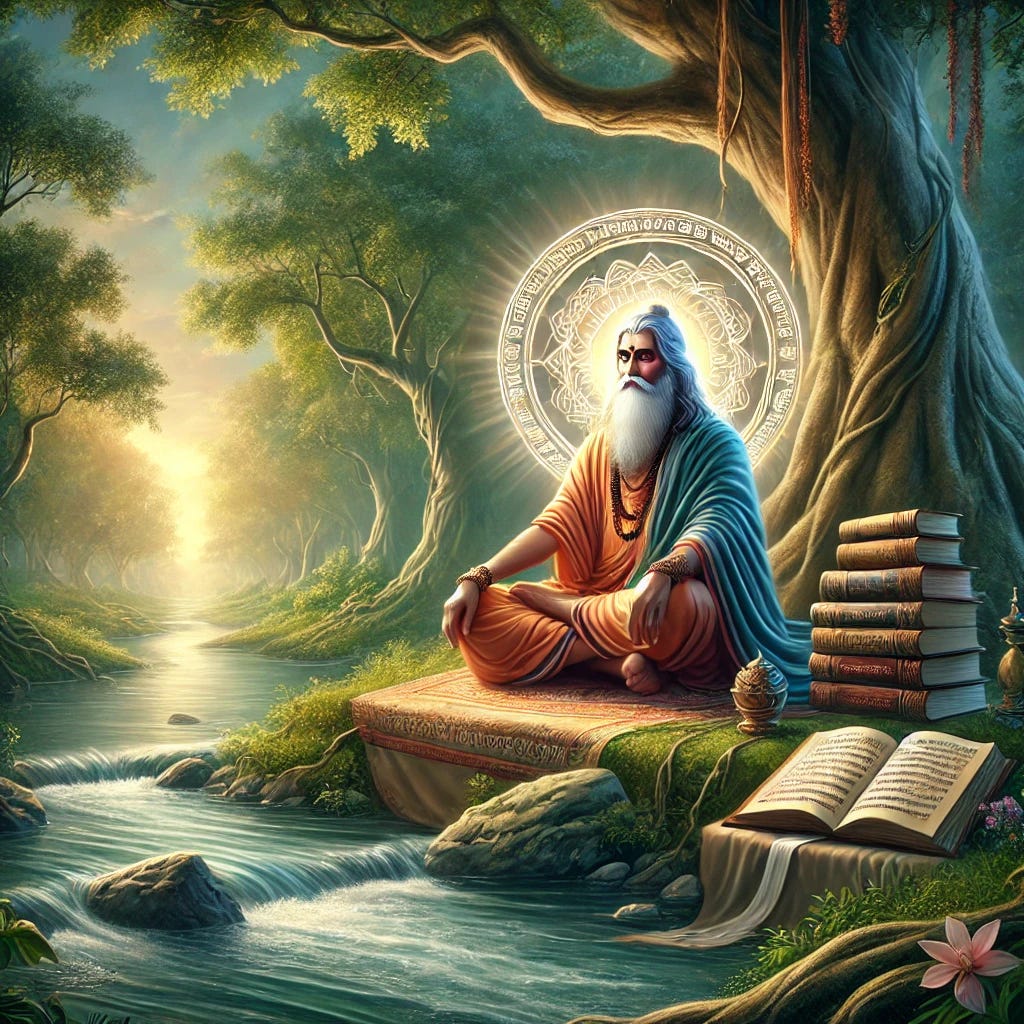The Genesis of the Bhagavata
BHAGAVATA PURANA DEEP DIVE - Part 7 - Vyasa’s Quest for Fulfillment
For previous editions of the BHAGAVATA PURANA DEEP DIVE CLICK HERE.
A Prelude of Praise
The sacred atmosphere of Naimisharanya reverberated with Sage Shounaka's heartfelt gratitude as he praised Suta Goswami for his profound discourse on the Supreme One’s incarnations. Yet, even amidst this flow of divine wisdom, an important question lingered in Shounaka’s heart. With great humility and anticipation, he asked:
What inspired the great sage Vyasa to compose the Bhagavata Purana?
Why was Shuka, Vyasa’s son, chosen as its reciter, and how did his unparalleled detachment reflect the depth of his realization?
What led King Parikshit to abandon his kingdom and engage in spiritual inquiry, becoming the recipient of this divine knowledge?
These inquiries became the foundation for Suta Goswami's next revelation.
Shuka: The Embodiment of Transcendence
Sage Shounaka recounted a striking anecdote about Shuka, the son of Vyasa. Shuka, though appearing to the ordinary eye as a wandering ascetic, was the epitome of detachment and self-realization.
One day, as Shuka wandered, Vyasa followed him, yearning to guide and protect his son. They came across a group of maidens bathing in a river. When Shuka passed by, the women remained unbothered and made no effort to cover themselves. However, when Vyasa arrived shortly after, they quickly draped their garments around their bodies.
Perplexed, Vyasa asked the maidens why they treated Shuka and him differently. They replied:
“The difference between men and women exists in you, but not in your son. He perceives no duality of gender, body, or form. His vision is firmly rooted in the absolute, beyond the distinctions of the material world.”
This story reveals the extraordinary transcendence of Shuka. He was devoid of material attachments and perceptions, making him the perfect vessel to deliver the Bhagavata Purana.
Vyasa’s Restlessness: The Beginning of a Quest
Suta then shifted the focus to the great compiler of the Vedas, Vyasa. The sage had already divided the single, vast body of Vedic knowledge into four parts—Rig, Yajur, Sama, and Atharva—for the benefit of humanity. Each of these divisions was entrusted to a specific sage and further disseminated by their disciples.
Vyasa also composed the Mahabharata, the epic narrative imbued with spiritual teachings and the wisdom of the Bhagavad Gita. He had labored tirelessly to make sacred knowledge accessible to souls enmeshed in ignorance. Yet, despite these monumental accomplishments, Vyasa’s heart remained restless and unsatisfied.
Why was this dissatisfaction present?
The inner turmoil of Vyasa is a profound reminder that intellectual accomplishment alone cannot bring fulfillment. True contentment comes when one engages in selfless service to the divine and creates avenues for others to connect with the eternal truth.
Reflection on the Banks of the Sarasvati
Consumed by a sense of incompleteness, Vyasa withdrew to the serene banks of the ancient Sarasvati River. There, in solitude, he began to introspect. His thoughts churned with questions:
Had he failed to fulfill his purpose?
Why was his heart weighed down, despite having shared the Vedic knowledge with the world?
What was missing in his contributions to humanity?
This moment of internal debate holds a mirror to our own spiritual journeys. It suggests that even the most accomplished individuals must periodically reassess their alignment with their higher purpose. Vyasa’s restlessness was not a failure but a divine nudge—a call to action that would lead to the birth of the Bhagavata Purana.
A Divine Encounter: Narada’s Arrival
Just as Vyasa grappled with his dissatisfaction, divine intervention arrived in the form of Sage Narada, the eternal wanderer and devotee of Krishna. Narada’s wisdom and insight would illuminate Vyasa’s path forward.
While the details of their transformative conversation will be explored in the next edition, this moment sets the stage for the Bhagavata Purana’s creation. Vyasa needed guidance to transcend his intellectual efforts and connect with the heart of devotion—bhakti.
The Role of King Parikshit
Sage Shounaka also asked Suta to recount the circumstances surrounding King Parikshit, the listener of the Bhagavata Purana. Why did a mighty ruler, born into a lineage of valor and devotion, renounce his kingdom and family to dedicate himself to spiritual inquiry?
This question underscores the universality of the Bhagavata’s teachings. Regardless of one’s station in life, the Bhagavata addresses the soul’s ultimate longing for liberation and divine connection. King Parikshit’s story exemplifies this, as we shall see in later discussions.
Inner Teachings: Lessons from Vyasa’s Restlessness
Vyasa’s journey to create the Bhagavata Purana offers profound insights for modern seekers:
Introspection is Essential
Like Vyasa, we must periodically step back from our endeavors and reflect on their alignment with our spiritual purpose. Dissatisfaction, when viewed positively, can be a sign that we are being called to a higher purpose.The Heart of Service
Vyasa had shared knowledge, but his works lacked the emotional connection that would inspire devotion and transformation. This reminds us that true impact arises when intellect is combined with heart-centered service.Transcend the Ego
The anecdote of Shuka reminds us of the importance of transcending ego and duality. Spiritual progress requires us to see beyond external distinctions and perceive the unity of all existence.
A Glimpse Ahead
As we conclude this chapter, the stage is set for one of the most transformative conversations in the Bhagavata Purana—the dialogue between Vyasa and Narada. Through this divine exchange, Vyasa will discover the key to his dissatisfaction and lay the foundation for the Bhagavata Purana as a timeless scripture of devotion, wisdom, and liberation.
Stay tuned for the next edition, where we will delve into this enlightening dialogue and uncover its significance for spiritual seekers across all ages.




